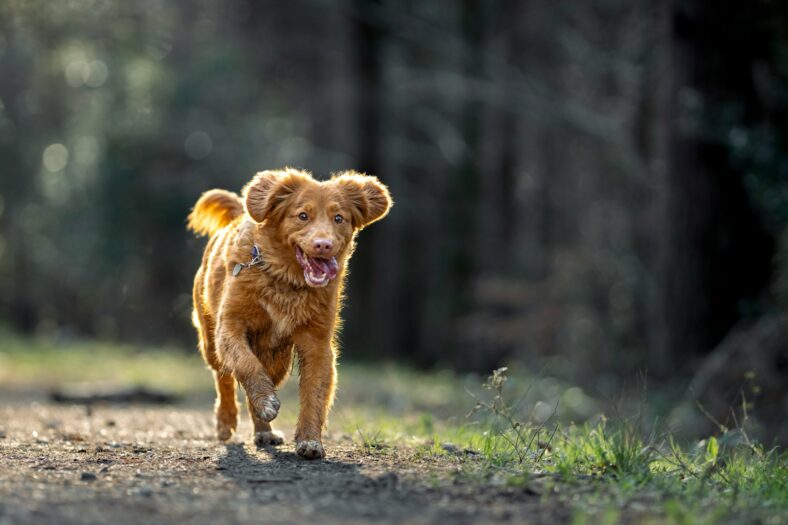
The holiday season may be a cheerful time full of gifts, food, candy, and decorations, but all of these components can provide potential dangers for dog owners as they try to keep their four-legged family members safe. With new sights, sounds, and hazards, it’s crucial to pay attention to your pup to ensure their well-being. Below is a holiday dog safety checklist to keep your pet in healthy spirits.
Safe Spaces
Safe spaces and boundaries for dogs are essential during the bustling holiday season. With revolving doors and a new set of faces every few days, dogs can get overwhelmed and lash out or escape through an open door. Instead of causing your dog any undue stress, try adding dog gates or playpens to create a secure area away from guests where dogs can decompress. Plus, if you’re worried your dog will escape during the festivities, investing in a door alarm or motion sensor may be the best course of action. Maintaining as much of their normal routine as possible is crucial to give dogs peace of mind and predictability.
Dangerous Foods

While escaping may pose some risks, the biggest one centers around food. Several festive and delicious dishes can contain toxic ingredients for dogs, such as onions, garlic, chocolate, and fatty meats. To best take care of your dog, ensure these foods are out of reach and remind your guests not to feed the dog human treats. Instead, provide healthy dog treats made from natural ingredients so your pups can still have something new and tasty without all the harmful side effects. Plus, you can invest in a puzzle toy or treat-dispensing ball to keep your dog busy away from the table, and possibly food scraps that slip through the cracks.
Holiday Decor
Holiday decor really creates a cheerful atmosphere, but sometimes these decorations can pose dangers for dogs. Tinsel and ornaments, of course, can be a danger if eaten, but certain holiday plants can be harmful to dogs. These include holly, mistletoe, poinsettias, and amaryllis, which and prompt gastrointestinal distress or more serious effects if ingested. ASPCA specifically highlights tinsel, as this alone can lead to life-threatening vomiting and dehydration. To prevent this, try keeping anything dangerous out of the dog’s reach or adding fences around your tree to discourage them from eating anything.
Mental Health
Beyond just the physical aspects, it’s important to focus on your dog’s mental health too. Loud noises from fireworks, strange faces in their home, and travel disruptions can increase anxiety in dogs and hurt their health. Try preventing or lessening the stress with calming aids, anxiety wraps, or sitting with your dog in a safe space can all help soothe your pet. You can also enroll your pup in a training program to eliminate poor behavior like jumping on guests or taking food.
Running Away

Even if you have motion sensors and alarms on your doors, escapes can happen. The best thing to do is be prepared if such an event occurs. The easiest way is by giving your dog up-to-date ID tags or investing in microchipping them. However, there is also new technology like a GPS tracking smart collar or even AirTags that can provide real-time locations to ensure your dog is safe during the busy season. When traveling with your pup, make sure to secure their harness, travel crate, and essentials to keep them safe and happy during the whole trip.
Keeping Your Pet Involved
Just like bringing your pup while traveling, you shouldn’t leave them out of holiday celebrations. Buying presents geared towards dogs, like interactive toys, treats, or other dog-safe options, can give them plenty of engagement while keeping them in the moment. Outdoor games like fetch or tug of war can also help with decreasing chewing on hazardous items, plus they can get out all that pent-up energy before your guests arrive.
Several pet organizations, such as the ASPCA, American Kennel Club, and Pet Food Institute, agree with these holiday dog safety checklist items. There is a responsibility owners must take during the holiday season to keep their dogs away from toxic food, keep them engaged, and lessen the overall stress of the holidays. If not, it can prove disastrous for both human and dog.
Holidays should be a time of connection, family, joy, and warmth; dogs included. By adding a few extra precautions and other measures, you can create a happy balance between dog and owner that will decrease the stress for everyone involved. That way, you can avoid an emergency trip to the vet, and instead watch your family share the love they have for each other.
